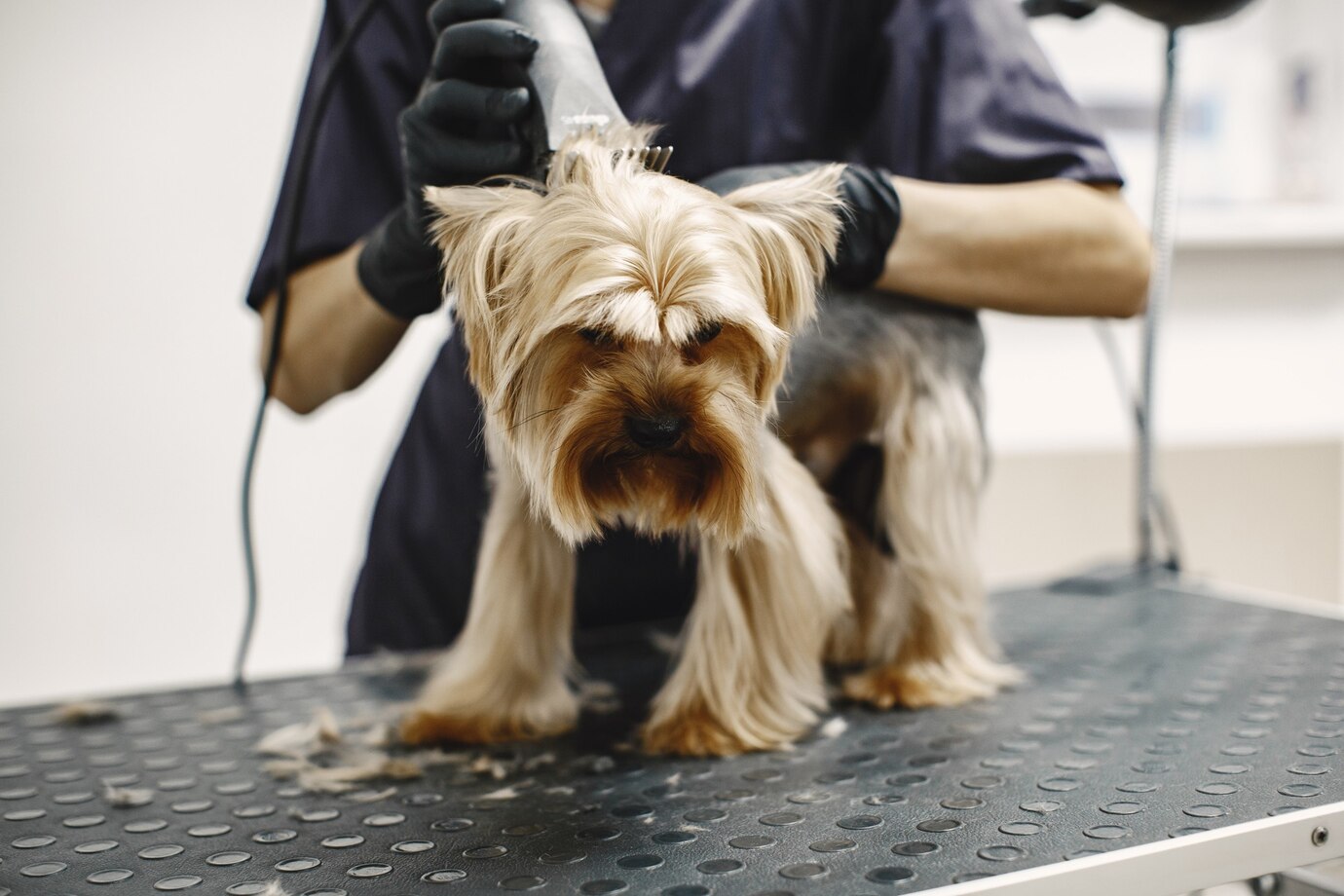Introduction
Dog salons have become increasingly popular among pet owners looking to pamper their furry friends with a touch of luxury. These facilities offer much more than just grooming; they provide a comprehensive array of services that cater to the overall health, hygiene, and happiness of dogs. Whether your pup needs a simple bath or a full spa experience, dog salons can enhance their well-being and improve their appearance.
However, there is more to caring for a dog than just grooming. Understanding how to recognize sick puppy symptoms is crucial for any dog owner. Visiting a dog salon frequently can actually help detect these symptoms early, as professional groomers often notice changes in a dog’s skin, coat, or behavior.
The Importance of Dog Grooming
Dog grooming is more than just a cosmetic routine; it’s a crucial aspect of a dog’s health. Grooming helps maintain a healthy coat and skin, reduces the risk of various health issues, and even aids in early detection of potential problems. A visit to the dog salon offers an opportunity for professional groomers to check for any unusual signs, including sick puppy symptoms, that may need further attention. These symptoms could range from lethargy and loss of appetite to more subtle indicators like unusual scratching or dullness in their coat.
Regular grooming also contributes to a dog’s comfort and emotional well-being. Just like humans, dogs feel better when they are clean and pampered. Grooming sessions can alleviate discomfort from matted fur, trim overgrown nails, and remove dirt and parasites that could lead to more severe conditions if left untreated.
Recognizing Sick Puppy Symptoms in a Dog Salon Setting

A professional groomer can be your first line of defense in identifying sick puppy symptoms. They are trained to observe and assess a dog’s behavior and physical state, which can be incredibly valuable in catching early signs of illness. Some common symptoms that groomers may notice include:
- Lethargy and Weakness: If your usually energetic puppy seems unusually tired or weak, it might be an early sign of illness. While some fatigue after a vigorous play session is normal, persistent lethargy is not.
- Loss of Appetite: Puppies are typically eager eaters. A lack of interest in food can indicate a range of health issues, from gastrointestinal problems to infections.
- Coughing and Sneezing: While these symptoms might be mild or even seasonal, they could also suggest respiratory infections, kennel cough, or other contagious diseases that require immediate attention.
- Vomiting and Diarrhea: These symptoms can be linked to dietary indiscretion, stress, or more serious conditions like parvovirus or parasites. Any persistent issues with digestion should be investigated by a veterinarian.
- Unusual Scratching or Licking: Excessive scratching or licking might indicate allergies, skin infections, or parasites such as fleas or mites. Groomers often encounter these issues and can offer insights on treatment or recommend a vet visit if necessary.
- Discharge from Eyes or Nose: Watery or mucus-like discharge from a puppy’s eyes or nose can point to infections or allergies. This is a symptom that should not be overlooked, especially if it is accompanied by other signs of illness.
Services Offered in a Dog Salon
Dog salons typically offer a wide array of services designed to cater to various breeds and individual needs. Some of the most common services include:
Bathing and Brushing
Essential for maintaining a dog’s hygiene, this service helps to remove loose fur, dirt, and debris from their coat. Regular bathing and brushing can prevent matting and promote a healthy shine, which also aids in reducing shedding.
Haircuts and Styling
Different breeds require different grooming styles, and dog salons offer breed-specific haircuts to enhance a dog’s natural appearance. Stylists can also create custom cuts based on a pet owner’s preference, blending functionality and aesthetics to ensure the dog looks and feels their best.
Nail Trimming and Paw Care
Overgrown nails can cause discomfort and lead to problems with walking. Professional groomers know how to trim nails safely, avoiding the quick and ensuring that the process is as stress-free as possible. Some salons also offer paw treatments to keep pads soft and free from cracks or irritations.
Ear Cleaning and Eye Care
Certain breeds are prone to ear infections and eye issues, which makes these services essential. Ear cleaning prevents the buildup of wax and debris that can cause infections, while eye care helps to remove tear stains and prevent irritation.
Dental Hygiene
Good oral health is vital for dogs, as dental issues can lead to more serious health complications. Many dog salons offer teeth brushing and scaling services to keep teeth and gums healthy and prevent bad breath.
Skin Treatments and Massages
Skin treatments, such as moisturizing baths or treatments for dry and itchy skin, help dogs with skin sensitivities. Massages can aid in relaxation, relieve muscle tension, and promote circulation.
Health and Wellness Checks
Many dog salons now include basic wellness checks to observe for any irregularities or sick puppy symptoms that may need further veterinary attention. This might include checking for lumps, changes in behavior, or any signs of discomfort.
Grooming Tips for Specific Breeds
Dog salons are well-versed in breed-specific grooming needs. Each breed has its unique coat type, skin sensitivity, and grooming requirements, which makes expert knowledge crucial. For instance:
Poodles and Doodles: These breeds require frequent brushing and regular trims to prevent matting and keep their curly coats healthy.
Bulldogs and Pugs: Due to their skin folds, these breeds are prone to infections and require meticulous cleaning and attention to their skin.
Retrievers and Shepherds: Known for their dense, double coats, these breeds benefit from thorough brushing to remove dead fur and reduce shedding.
Choosing the Right Dog Salon
Selecting a reputable dog salon is essential to ensure your pet receives high-quality care. Here are some factors to consider when choosing a dog salon:
Qualifications and Experience: Look for salons that employ certified groomers who have experience with a variety of breeds and grooming techniques.
Sanitation Practices: A clean and well-maintained salon indicates attention to hygiene and reduces the risk of infections or other health issues.
Customer Reviews and Recommendations: Word-of-mouth referrals and online reviews can offer insight into the level of service and care provided by the salon.
Range of Services: Choose a salon that provides the specific services your dog needs, whether it’s basic grooming or more specialized treatments.
Communication and Transparency: A good salon should communicate clearly about their services, pricing, and any concerns they might have regarding your dog’s health.
The Health Benefits of Regular Grooming

While it might seem like grooming is purely about aesthetics, it is also closely linked to your dog’s health. Regular grooming can help prevent various health issues and provides an opportunity to monitor changes in your dog’s body. Early detection of sick puppy symptoms during a grooming session can lead to prompt veterinary care, potentially catching conditions early when they are more manageable.
Skin Health: Regular grooming helps to prevent matting and tangling, which can lead to skin irritation and infection. Groomers are trained to spot lumps, rashes, or hotspots that might go unnoticed by pet owners.
Preventing Parasites: Groomers often spot ticks, fleas, and mites during grooming sessions. Quick identification and treatment of these parasites can prevent more severe health issues and discomfort.
Improving Circulation: Grooming techniques like brushing and massage stimulate circulation and can promote better skin and coat health, as well as a calming effect on your pet.
How to Choose the Right Dog Salon
Selecting the right dog salon for your pet requires some research. Here are some factors to consider:
Reputation and Reviews: Look for salons with positive reviews and testimonials from other dog owners. Word of mouth is often one of the best ways to find a reliable grooming salon.
Qualified Staff: Check if the groomers are certified or have relevant experience, especially with your dog’s specific breed. Experienced groomers can better handle difficult situations and are more likely to recognize sick puppy symptoms.
Hygiene and Safety Standards: Visit the salon to assess cleanliness and the overall atmosphere. Ensure they follow proper sanitization procedures for their tools and equipment.
Services and Pricing: Compare the range of services offered and their prices. Some salons offer packages or memberships that can be more economical in the long run.
Pet Comfort and Environment: Observe the setup of the salon. Look for a calm and pet-friendly environment that reduces stress and anxiety for your dog.
Final Thoughts on Dog Salons and Sick Puppy Symptoms
A visit to a dog salon can provide more than just a fresh look for your pet. It can be an opportunity to monitor your dog’s health, prevent issues, and ensure they are as comfortable as possible. By choosing a reputable salon and being aware of sick puppy symptoms, you can give your furry friend the care and attention they deserve. A clean, well-groomed dog is not only more comfortable but also healthier and happier.